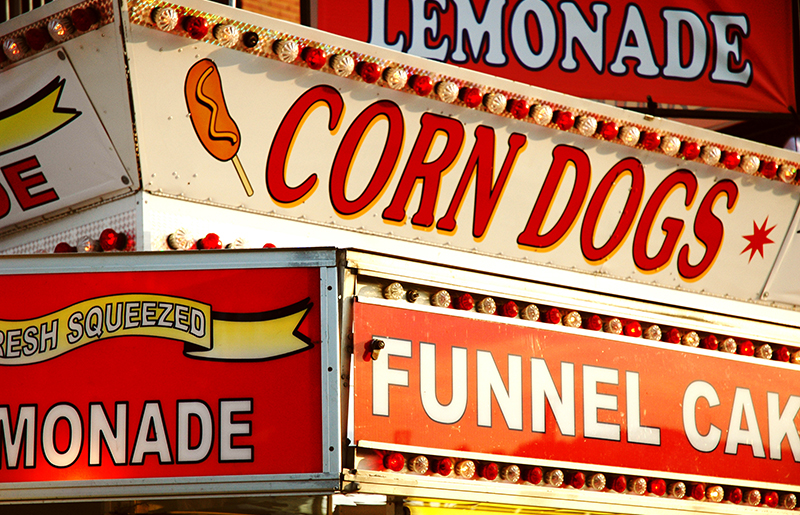Fried Kool-Aid, anyone? How about a pickle pizza? Why not take a bite of a cotton candy cloud straight out of a Dr. Suess book? These are all real examples of concession stand food novelties popping up across the country. Owners of theme parks, rodeos, and other amusement venues are actively seeking new ways to make their food offerings stand out in a crowded field. This blog post will examine three prevalent trends with concessionaires: themed food, extreme food, and allergy/diet-conscious foods. We will also delve into how to create fun concession stand food experiences while keeping customers and park owners protected.
Also read: Food Concessions: What Concessionaires Need to Know
Immerse guests in a themed world
This approach to creating concession stand food magic involves taking relatively ordinary fare (like cotton candy) and fitting it into an intellectual property or story world with a lot of recognition. The Universal Studios theme park in Florida is particularly good at this strategy. At Honk Honkers Cafe, customers can build their own cotton candy using a variety of flavors and toppings while enjoying the Dr. Seuss atmosphere.
In another section of Universal Studios theme park, concessionaires serve up traditional British fare (like bangers and mash) inspired by the world of Harry Potter. Vendors serve up nearly a dozen varieties of butterbeer and “exploding” bonbons filled with exciting flavors and pop rocks. Customers can enjoy immersive, family-friendly food experiences with a themed food approach. Another perk is that themed experiences are highly shareable on social media.
Shock and excite attendees while they dine
Other venues, particularly carnivals, take a more daring approach to concession stand food. They seek out innovative, oversized, and even downright bizarre foods to generate buzz. The Houston Livestock Show and Rodeo has mastered the art of extreme food. So much so that they created an annual food contest with 52 categories judged by local and celebrity chefs. Competitors have a chance to take home accolades like Best Fried Food, Best Food-on-a-Stick, Most Creative Food, and Best New Flavor. The 2022 winners included deep-fried jambalaya, an all-meat stuffed potato, and a bonfire funnel cake (a cross between a s’more and a funnel cake served flambé.
This approach to concessions creates novel, memorable experiences and defies consumer expectations.
Include options for everyone
Another trend involves catering to consumers with specialty diets. For example, the Iowa State Fair highlights vendors with gluten-free options.
However, there is a certain amount of risk to this approach. The FDA has stringent guidelines on what qualifies as gluten-free—less than 20 parts per million of gluten from testing. However, these guidelines are intended for food manufacturers, not restaurants. This lack of clarity has created confusion about what qualifies as gluten-free and has led to various gluten-free certifications by independent certifiers like the GFCO.
To reduce the risk of cross-contamination, it’s important for concessionaires to receive training on proper preparation and serving protocols for allergen-free foods. Unfortunately, it is not possible to eliminate risk altogether. Venues can safeguard against liability by avoiding explicit allergy claims (e.g., gluten- or dairy-free) unless concession stands are certified in those areas. Posting a disclaimer on menus about cross-contamination is also smart.
Keeping concession stand food safe
While creating fun and novel experiences, concessionaires must prioritize safety. Quality of raw ingredients, onsite food handling and preparation, and serving alcohol are a few examples of concession-related areas of liability for venues.
Concessionaires must avoid ingredients that are near spoilage or that have been improperly transported to the venue. Additionally, venues must adequately train concessionaires in the latest food safety guidelines to ensure that all food is stored and cooked correctly. These considerations limit customers’ exposure to food-borne illnesses as much as possible.
Additionally, making alcohol available to guests increases liability dramatically due to the possibility of overserving or damages inflicted by intoxicated customers. Responsible concessionaires execute a food safety plan and invest in staff training.
Read more: Food Safety in Concessions: Are You Prepared?
Protect yourself with insurance coverage
Themed food, extreme food, and allergy-friendly options are clever ways for concession food stands to generate buzz in the current market. But each of these approaches comes with risk. Regardless of precautions, food poisoning, allergic reactions, and liquor overconsumption are always risks for concessionaires. A single instance of food poisoning has the potential to bankrupt concession vendors through legal damages.
McGowan Allied has over three decades of experience helping the amusement industry manage risk. A wide range of coverage options allows park owners to create individualized plans that best suit their needs. Get in touch today or call us at 727-353-6230 to review the best way to protect your concessionaires and customers.
